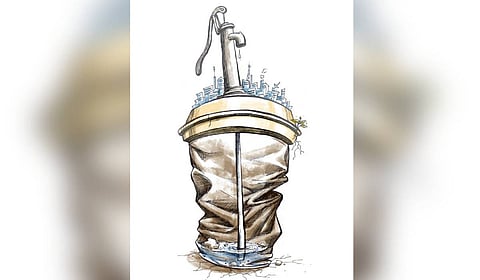

KOCHI: The decision of the state ground water department (GWD) to impose restrictions on extraction of groundwater from borewells for irrigation purposes in the critical zones of Chittoor and Malampuzha taluks in Palakkad district has triggered protests by farmers.
Meanwhile, the Palakkad district groundwater officer has written to the department seeking to relax the curbs to allow crop-based allocation of water.
The state had implemented the Kerala Ground Water (Control and Regulation) Act in 2002. Areas where removal is more than 90% of the annually extractable water are classified as critical while areas that extract 70-90% are categorised semi-critical. Chittoor and Malampuzha, besides Kasaragod taluk are the critical zones in the state.
The farmers of Chittoor and Malampuzha blocks grow coconut trees, paddy, plantain and vegetables — which are all water-intensive crops.
However, the Palakkad Gap area, which includes Chittoor and Malampuzha, is a comparatively rain-shadow region where annual rainfall is a mere 1,500 mm.
In the parched farmlands, farmers depend on groundwater resources to water crops. However, the imposed restrictions, including making permits must for sinking borewells, ceiling on daily extraction, installation of flow meters, etc., have irked farmers. “The restrictions are not practical.
We need to irrigate paddy and vegetables. There is acute shortage of water in Chittoor where we cultivate plantain, paddy and vegetables extensively.
If the government wants to restrict the extraction of groundwater, they should provide us water from the dam through canals,” said Pandiyode Prabhakaran, a local farmer.
Meanwhile, groundwater levels are depleting in Vadakarappathi, Eruthempathy and Kozhinjambara areas where borewells are 400-600 ft deep.
The district-level evaluation committee has the authority to sanction motors in the 3-5 HP range. It is the state-level authority that approves motor pumps of over 5 HP capacity.
“Flow meters were introduced based on the Ground Water Control and Regulation Act, 2002. However, we did not make it mandatory until an inspection team from the accountant general’s office highlighted lapses in 2023. There are many restrictions on allocation of permits for installing borewells, which we have relaxed.
We grant permits to dig wells and after that provide a conversion permit which will help farmers get free power. We have urged farmers to install flow meters and submit the original receipt while applying for conversion permits,” said GWD Palakkad district officer Arts K Purushotham.
He said many applicants submitted fake receipts of flow meters, which was revealed during the audit. So now the GWD has started inspecting farmlands to ensure that flow meters are installed. Farmers are provided a book in which they have to note down the meter reading every day.
“We conduct yield tests before granting conversion permits to decide the availability of water in the underground resource based on which the maximum extractable quantity is fixed. Considering the protest, I have written to the state authority to provide relaxation on the maximum daily extractable water based on crops,” he said.